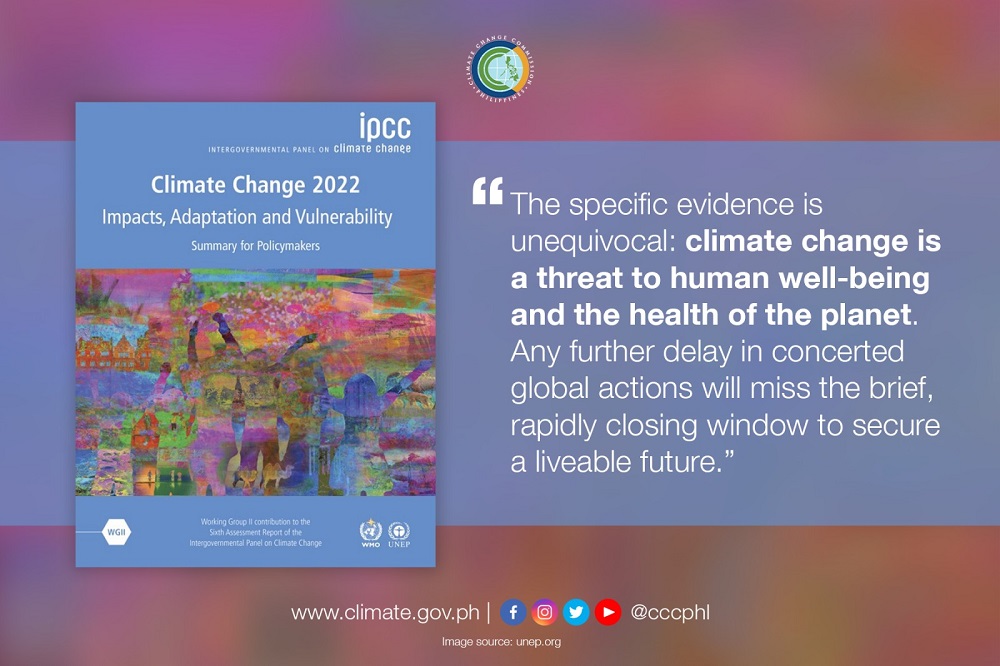
March 03, 2022 Thursday

MANILA, 3 March 2022 — Following the latest report of the United Nations Intergovernmental Panel on Climate Change (IPCC) that further reveals the Earth’s vulnerability to the impacts of climate change, the Climate Change Commission (CCC) emphasizes the urgent need to accelerate and strengthen adaptation and mitigation measures, especially at the community and local level.
The contribution of the IPCC’s Working Group II to the Sixth Assessment Report (AR6), affirms that “global warming has caused dangerous and widespread disruption in nature,” and “climate change is affecting the lives of billions of people, despite efforts to adapt.”
“I have seen many scientific reports in my time, but nothing like this. Today’s IPCC report is an atlas of human suffering and a damning indictment of failed climate leadership. With fact upon fact, this report reveals how people and the planet are getting clobbered by climate change,” said UN Secretary-General António Guterres.
To recall, the Working Group I report, released in August 2021, showed that emissions of greenhouse gases from human activities are responsible for approximately 1.1°C of warming since 1850-1900, and that over the next 20 years, global temperature is expected to reach or exceed 1.5°C of warming.
The second installment of the AR6 focuses on the impacts of climate change on nature and people around the globe, explores the future impacts at different levels of warming and the resulting risks, and offers options to strengthen nature’s and society’s resilience to ongoing climate change, to fight hunger, poverty, and inequality and keep Earth a place worth living on – for current as well as for future generations.
“The report is a dire warning about the consequences of inaction. It shows that climate change is a grave and mounting threat to our well-being and a healthy planet. It also shows that our actions today will shape how people adapt to climate change and how nature responds to increasing climate risks,” said IPCC Chair Hoesung Lee.
The report introduces a special section on climate change impacts, risks, and options to act for cities and settlements by the sea, tropical forests, mountains, biodiversity hotspots, dryland and deserts, the Mediterranean as well as the polar regions; and an atlas that will present data and findings on observed and projected climate change impacts and risks from global to regional scales.
Specifically, the report presents the following points:
·Human-induced climate change, including more frequent and intense extreme events, has caused widespread adverse impacts and related losses and damages to nature and people, beyond natural climate variability. Some development and adaptation efforts have reduced vulnerability. Across sectors and regions the most vulnerable people and systems are observed to be disproportionately affected. The rise in weather and climate extremes has led to some irreversible impacts as natural and human systems are pushed beyond their ability to adapt.
·Progress in adaptation planning and implementation has been observed across all sectors and regions, generating multiple benefits. However, adaptation progress is unevenly distributed with observed adaptation gaps. Many initiatives prioritize immediate- and near-term climate risk reduction which reduces the opportunity for transformational adaptation.
·Evidence of observed impacts, projected risks, levels and trends in vulnerability, and adaptation limits, demonstrate that worldwide climate resilient development action is more urgent than previously assessed in AR5. Comprehensive, effective, and innovative responses can harness synergies and reduce trade-offs between adaptation and mitigation to advance sustainable development.
“Our atmosphere today is on steroids, doped with fossil fuels. This is already leading to stronger, longer, and more frequent extreme weather events. Climate change-induced disasters come with high human and economic impacts,” said World Meteorological Organization (WMO) Secretary-General Prof. Petteri Taalas.
“This new IPCC report comes out at a time of great turmoil, when we need strong multilateralism to promote peace and a healthy environment. And the message this report sends is clear. Climate change isn’t lurking around the corner, waiting to pounce. It’s already upon us, raining down blows on billions of people,” said UN Under-Secretary-General and UN Environment Programme Executive Director Inger Andersen.
Meanwhile, the Working Group III report, which will focus on reducing greenhouse gas emissions (climate change mitigation), will be released on April, according to the IPCC.
The CCC said that the latest IPCC release evidently illustrates the catastrophic effects of climate change and of rising temperatures in many parts of the world, including our country. Action to help our communities adapt is urgently needed.
Further, the National Panel of Technical Experts of the CCC has recently identified the leading climate-induced risks in the Philippines along with recommended strategies and measures to address long-term vulnerabilities and increase the country’s adaptive capacity to the impacts of the worsening climate.
The Commission vows to accelerate and improve local climate action by making climate risk information more available, understandable, and actionable. Despite the challenges of a global pandemic, the CCC will continue to strive to reach and capacitate as many local governments as possible in understanding risks and how these should be addressed by implementing effective and coherent adaptation and mitigation measures.
Access the Working Group II’s contribution to the Assessment Report through this link: https://www.ipcc.ch/